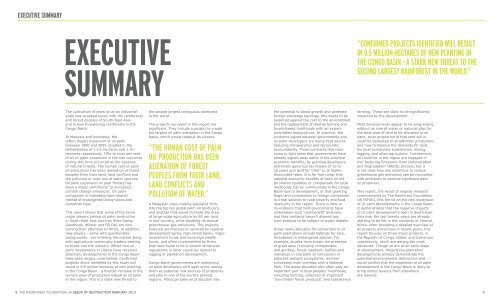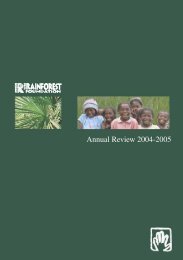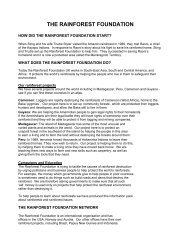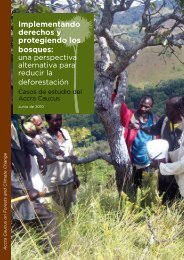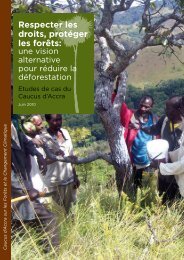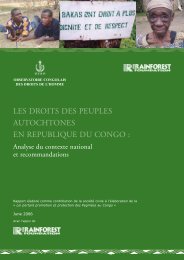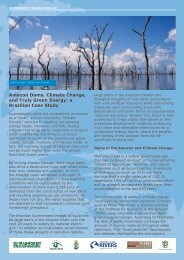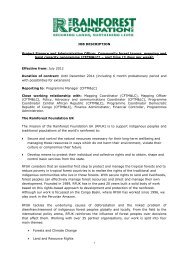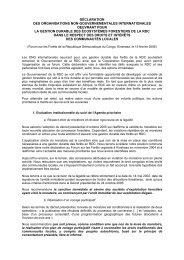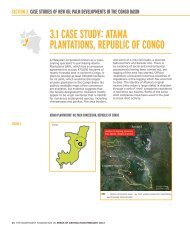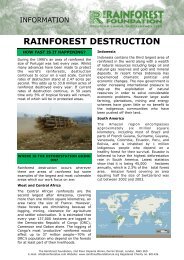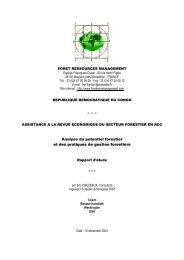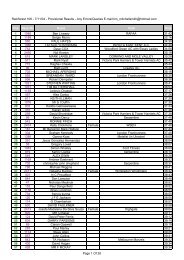Seeds of Destruction - Rainforest Foundation UK
Seeds of Destruction - Rainforest Foundation UK
Seeds of Destruction - Rainforest Foundation UK
Create successful ePaper yourself
Turn your PDF publications into a flip-book with our unique Google optimized e-Paper software.
EXECUTIVE SUMMARY<br />
EXECUTIVE<br />
SUMMARY<br />
“CONFIRMED PROJECTS IDENTIFIED WILL RESULT<br />
IN 0.5 MILLION HECTARES OF NEW PLANTING IN<br />
THE CONGO BASIN - A STARK NEW THREAT TO THE<br />
SECOND LARGEST RAINFOREST IN THE WORLD.”<br />
The cultivation <strong>of</strong> palm oil at an industrialscale<br />
has wreaked havoc with the rainforests<br />
and forest peoples <strong>of</strong> South-East Asia<br />
and is now threatening rainforests in the<br />
Congo Basin.<br />
In Malaysia and Indonesia, the<br />
(<strong>of</strong>ten illegal) expansion <strong>of</strong> oil palm<br />
between 1990 and 2005 resulted in the<br />
deforestation <strong>of</strong> 1.1m hectares and 1.7m<br />
hectares respectively. Fifty to sixty per cent<br />
<strong>of</strong> all oil palm expansion in the two countries<br />
during this time occurred at the expense<br />
<strong>of</strong> natural forests. The human cost <strong>of</strong> palm<br />
oil production has been alienation <strong>of</strong> forest<br />
peoples from their land, land conflicts and<br />
the pollution or over-use <strong>of</strong> water sources.<br />
Oil palm expansion on peat forests has<br />
been a major contributor to increased<br />
climate change emissions. Oil palm<br />
companies in Indonesia have cleared<br />
habitat <strong>of</strong> endangered Orang-utans and<br />
Sumatran tiger.<br />
This report shows that some <strong>of</strong> the same<br />
major players behind oil palm production<br />
in South-East Asia (such as Sime Darby,<br />
Goodhope, Wilmar and FELDA) are now<br />
turning their attention to Africa. In addition,<br />
new players - some with questionable<br />
backgrounds - are entering the market along<br />
with agricultural commodity traders seeking<br />
to break into the industry. Whilst new oil<br />
palm investments in Liberia have received<br />
attention, developments in the Congo Basin<br />
have been largely unremarked. Confirmed<br />
projects alone identified by this study will<br />
result in 0.5 million hectares <strong>of</strong> new planting<br />
in the Congo Basin - a fivefold increase in the<br />
current area <strong>of</strong> productive industrial oil palm<br />
in the region. This is a stark new threat to<br />
the second largest contiguous rainforest<br />
in the world.<br />
The projects surveyed in this report are<br />
significant. They include a project to create<br />
the largest oil palm plantation in the Congo<br />
Basin, which would catapult its owners,<br />
“THE HUMAN COST OF PALM<br />
OIL PRODUCTION HAS BEEN<br />
ALIENATION OF FOREST<br />
PEOPLES FROM THEIR LAND,<br />
LAND CONFLICTS AND<br />
POLLUTION OF WATER.”<br />
a Malaysian ‘pipe-coating specialist’ firm,<br />
into the top ten global palm oil producers,<br />
and another that would increase the area<br />
<strong>of</strong> large-scale agriculture by 85 per cent<br />
in one country, while doubling its annual<br />
greenhouse-gas emissions. The projects<br />
featured are financed or serviced by regional<br />
development banks, high-street banks, major<br />
investment funds and sovereign wealth<br />
funds, and <strong>of</strong>ten implemented by firms<br />
that have found to be in breach <strong>of</strong> national<br />
regulations in other countries related to<br />
logging or plantation development.<br />
Congo Basin governments are welcoming<br />
oil palm developers with open arms, seeing<br />
them as potential new sources <strong>of</strong> prosperity<br />
and jobs in one <strong>of</strong> the world’s poorest<br />
regions. Although palm oil production has<br />
the potential to boost growth and generate<br />
foreign exchange earnings, this needs to be<br />
balanced against the cost to the environment<br />
and the replacement <strong>of</strong> diverse farming and<br />
forest-based livelihoods with an exportorientated<br />
monoculture. In practice, the<br />
contracts signed between governments and<br />
oil palm developers are being kept secret,<br />
reducing transparency and democratic<br />
accountability. Those contracts that have<br />
come to light show that governments have<br />
already signed away some <strong>of</strong> the potential<br />
economic benefits, by granting developers<br />
extremely generous tax breaks <strong>of</strong> 10 to<br />
16 years and land for “free” or at highlydiscounted<br />
rates. It is far from clear that<br />
national economic benefits <strong>of</strong> palm oil will<br />
be shared equitably or compensate for local<br />
livelihoods lost by communities in the Congo<br />
Basin due to development, or that granting<br />
large land concessions to foreign companies<br />
is a real solution to rural poverty and food<br />
insecurity in the region. There is little or<br />
no evidence that host governments have<br />
undertaken such ‘cost-benefit’ analyses,<br />
and they certainly haven’t allowed any<br />
such analysis to be subject to public debate.<br />
Areas newly allocated for conversion to oil<br />
palm plantations include habitats for rare,<br />
threatened or endangered species. For<br />
example, studies have shown the presence<br />
<strong>of</strong> great apes (including chimpanzees<br />
and gorillas), forest elephant, buffalo and<br />
manatees in one palm oil concession or<br />
adjacent wetland ecosystems. Another<br />
concession even overlaps with a National<br />
Park. The areas allocated also <strong>of</strong>ten play an<br />
important part in local peoples’ livelihoods,<br />
including hunting, collection <strong>of</strong> important<br />
‘non-timber forest products’, and subsistence<br />
farming. These are likely to be significantly<br />
impacted by the development.<br />
Most developments appear to be progressing<br />
without an overall vision or national plan for<br />
the total area <strong>of</strong> land to be allocated to oil<br />
palm, what proportion <strong>of</strong> that land will or<br />
could be dedicated to smallholder production,<br />
and how to balance the demands for land<br />
for local community subsistence, mining,<br />
logging, and other agriculture. Furthermore,<br />
all countries in the region are engaged in<br />
the ‘Reducing Emissions from Deforestation<br />
and Degradation’ (REDD) process, but it<br />
is not clear how any ambitions to reduce<br />
greenhouse gas emissions can be reconciled<br />
with ambitions to become significant palm<br />
oil producers.<br />
This report, the result <strong>of</strong> original research<br />
commissioned by The <strong>Rainforest</strong> <strong>Foundation</strong><br />
<strong>UK</strong> (RF<strong>UK</strong>), lifts the lid on the new expansion<br />
<strong>of</strong> oil palm developments in the Congo Basin.<br />
It demonstrates that the negative impacts<br />
<strong>of</strong> oil palm developments seen in South-East<br />
Asia over the last twenty years are already<br />
starting to be felt in the countries <strong>of</strong> Central<br />
Africa. After providing a detailed overview <strong>of</strong><br />
all projects announced in recent years, this<br />
report focuses on three major projects, in<br />
the Republic <strong>of</strong> Congo, Gabon and Cameroon<br />
respectively, which are among the most<br />
advanced. Though all are at an early stage<br />
<strong>of</strong> development, these three plantation<br />
developments already demonstrate the<br />
potential environmental destruction and<br />
social conflict that the expansion <strong>of</strong> oil palm<br />
development in the Congo Basin is likely to<br />
bring unless lessons from elsewhere<br />
are learned.<br />
8 THE RAINFOREST FOUNDATION <strong>UK</strong> SEEDS OF DESTRUCTION FEBRUARY 2013 9


